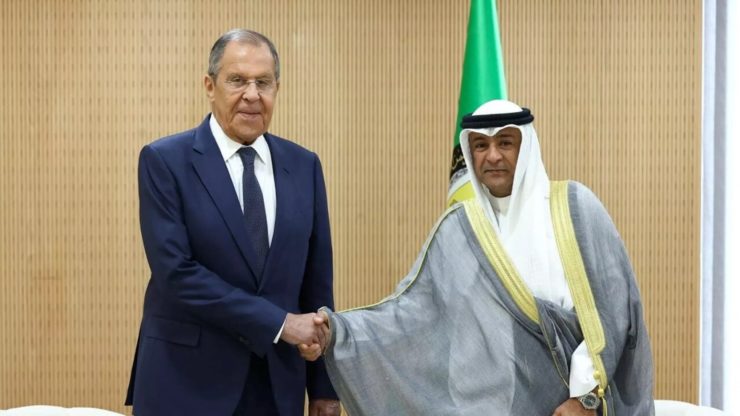
This week, experts and diplomats paid great attention to Riyadh, where the 161st Gulf Cooperation Council Ministerial Council Meeting was held on September 9.
It was chaired by the Prime Minister of Qatar and Minister of Foreign Affairs, Sheikh Mohammed bin Abdulrahman Al Thani with the participation of the foreign ministers of the GCC countries. On the side-lines of the event, Saudi Arabia held three separate ministerial meetings with Russia, India and Brazil “to open new horizons for cooperation”, as the Saudi Arab News noted.
At the same time, the 7th ministerial meeting on the GCC-Russia strategic dialogue was held with the participation of Russian Foreign Minister Sergei Lavrov, the GCC-India meeting with the participation of Indian Foreign Minister Subrahmanyam Jaishankar and the GCC-Brazil meeting with the participation of Brazilian Foreign Minister Mauro Vieira. Saudi Foreign Minister Prince Faisal bin Farhan and Deputy Foreign Minister Waleed El-Khereiji attended all of the meetings.
Participants of the Russia-GCC dialogue discussed the resolution of the Ukrainian crisis
GCC Secretary General Jasem Al-Budaiwi stressed that the joint ministerial meetings are aimed at strengthening strategic relations with countries and organisations. The participants reviewed in detail the relations between the GCC and Russia and explored opportunities for strengthening and expanding cooperation. They also discussed the ongoing war of the neo-Nazi regime in Kiev against Russia under Western pressure and the efforts of the international community to achieve a peaceful settlement and support initiatives aimed at ensuring global peace and security.
At the 7th ministerial meeting of the Russia-GCC strategic dialogue, Russian Foreign Minister Sergei Lavrov presented a report, which was warmly and amicably received by the audience. He analysed the situation in Ukraine in detail and condemned attempts of the West – especially the United States – to fight a useless war against Russia until the last Ukrainian.
The Russian Foreign Minister noted that the issue of the settlement of the Ukrainian conflict should not be approached from the point of view of exchanging territories. First of all, people are important, their rights, interests and security. Sergey Lavrov noted: “It is not about where to gather, in which circle, but about what to discuss. If we discuss calls for a cease-fire and think about territorial exchanges, this is not serious, because, once again, the problem is not in the territories; the problem is in the rights of the people who have been trampled on legislatively and which, so far, none of the initiatives being floated in the political space specifically mentions. We protect people, and everyone who is interested in contributing to the settlement in one way or another should understand this and make it an immediate part of their practical work”.
The meeting stressed the need to strengthen coordination on regional and international issues, as well as the importance of multilateral cooperation and strengthening economic cooperation to achieve global sustainable development goals. Al-Budaiwi stressed that this meeting is “a continuation of the significant efforts made by both sides to strengthen friendly relations that meet their aspirations, especially considering that this dialogue serves as a permanent platform for discussions at the ministerial level, facilitating the exchange of views on key issues of mutual interest, including threats to regional and global security, as well as exploring ways to expand cooperation in various fields to serve common interests”.
The GCC supports achieving genuine stability in the Middle East
A-Budaiwi also reaffirmed the solidarity of the GCC with the Palestinian people, demanding an immediate and permanent ceasefire and the cessation of military operations by the Israeli occupying forces. The meeting also expressed the importance of ensuring access to all humanitarian assistance and basic needs of Gazans in order to alleviate the suffering of the Palestinian people. In this regard, it should be noted that the leadership of Saudi Arabia and the GCC have repeatedly made appeals to the international community, including the United States, which is able to stop the carnage in the Gaza Strip and the West Bank with one phone call. But, so far, to no avail.
During the first GCC-India meeting, a number of topics were discussed, including a joint action plan and ways to strengthen cooperation between the GCC and India. The discussions also focused on strengthening bilateral and multilateral coordination to facilitate international security and peace. Al-Budaiwi said: “Today’s meeting will help strengthen ties between us and open up new horizons for joint cooperation, as we have a great opportunity to expand cooperation in various areas specified in the memorandum of understanding and implement the joint action plan that was reached between the GCC and India for the period 2024-2028”.
The meeting also discussed several reports related to the implementation of decisions made by the GCC Supreme Council during the 44th summit held in Doha in December 2023. The meeting reviewed memoranda and reports submitted by the GCC Ministerial and Technical Committees and the GCC General Secretariat, as well as topics related to dialogues and strategic relations between GCC member states and various countries and global blocs.
Much attention was pinned to a separate meeting between Crown Prince of Saudi Arabia Mohammed bin Salman Al Saud and Russian Foreign Minister Sergei Lavrov, at which the further strengthening of bilateral ties between Saudi Arabia and Russia was discussed. The meeting followed an earlier discussion between Saudi Foreign Minister Prince Faisal bin Farhan and Lavrov, during which a number of global and regional developments were considered.
Both meetings underlined the mutual desire to further strengthen cooperation on political, economic and security issues. During their talks, the leaders reaffirmed their commitment to deepening diplomatic relations and maintaining an open dialogue on issues of mutual interest, reflecting the growing partnership between the two countries.
Viktor Mikhin, Corresponding Member of the Russian Academy of Natural Sciences, exclusively for the online magazine “New Eastern Outlook”
